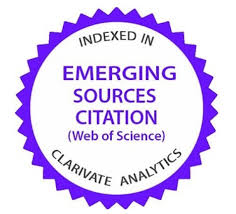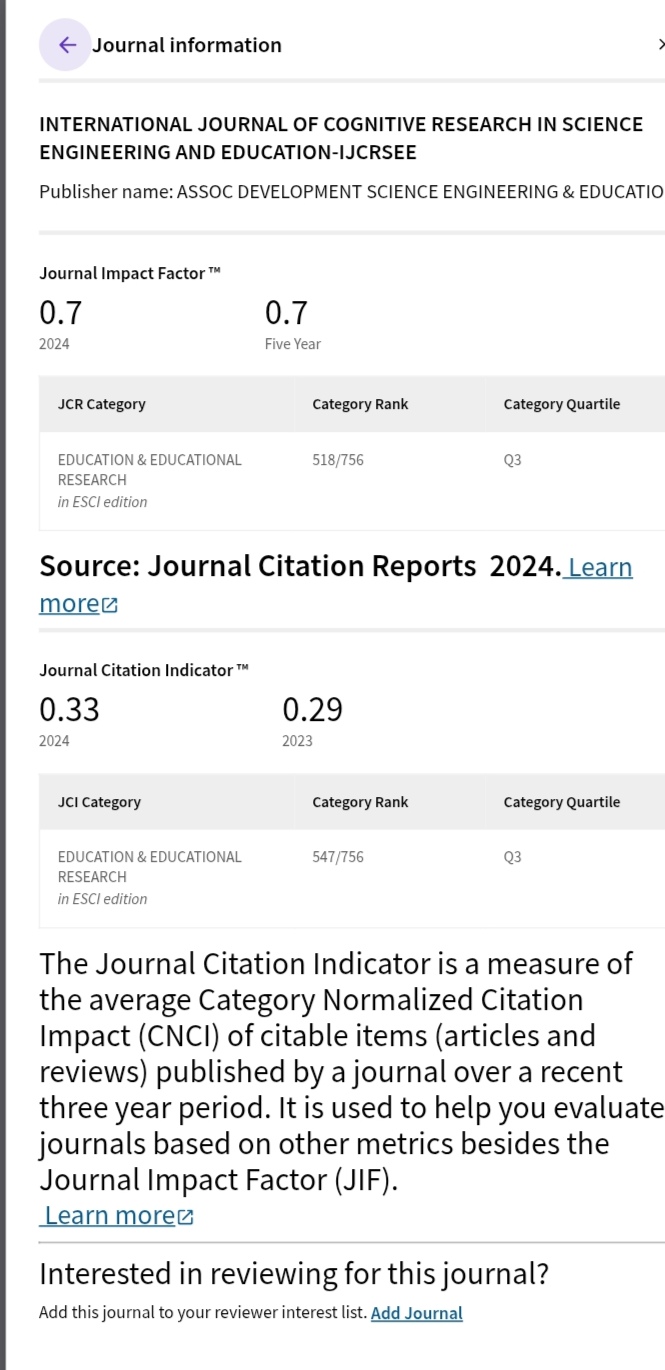Enhancing Early Childhood Students’ Computational Thinking Competency Through Digital Game-Based Learning
DOI:
https://doi.org/10.23947/2334-8496-2025-13-2-365-378Keywords:
digital game-based learning, computational thinking, early childhood, experimental methodAbstract
This study investigated how the computational thinking competencies of students classified in the early childhood category can be developed through digital game-based learning. Computational thinking is a way of thinking that includes problem solving, algorithmic thinking and logical inference skills is considered an important competence that should be acquired at an early age. Digital game-based learning stands out as a powerful tool for developing computational thinking skills while providing a fun and motivating environment by ensuring the active participation of students. Within the scope of the research, the effects of digital game-based learning activities on students’ computational thinking skills were examined by experimental method, one of the quantitative research methods. In this study, a 4-week training activity was conducted for the experimental and control groups determined during the research process to develop computational thinking skills in 5-year-old pre-school children. The study group consists of 50 students in the 5-year-old age group studying in the pre-school class of a state institution. In the study, student groups were divided into experimental and control groups. The experimental and control groups consisted of 25 students. The achievement test prepared for the cognitive domain was used as a pre-test and post-test as the data collection tool. In addition to this data collection tool, an evaluation rubric was also used in the study. The findings showed that digital game-based learning methods positively affect the development of computational thinking skills in early childhood. In light of these findings, recommendations were made in the study for the integration of digital games into relevant educational programs and the promotion of computational thinking at an early age.
Downloads
References
Akkaya, A. (2018). The effects of serious games on students’ conceptual knowledge of object-oriented programming and computational thinking skills (No. 526681) [Master thesis, Bogazıcı University]. YOK. https://tez.yok.gov.tr
Aksoy, P. (2021). A classroom-based training program involving pre-school children for developing pre-requisite learning skills and social skills: Ready to Learn. Adıyaman University Journal of Educational Sciences, 11(2), 107-124. https://doi.org/10.17984/adyuebd.709921 DOI: https://doi.org/10.17984/adyuebd.709921
Agırgol, M., Kara, E. & Dönel Akgül, G. (2022). The effect of science courses with educational digital games on students’ knowledge retention, academic success and attitude. International Journal of Science and Education, 5(3), 157-176. https://doi.org/10.47477/ubed.1063920 DOI: https://doi.org/10.47477/ubed.1063920
Arslan, K. & Gorgulu Arı, A. (2023). The Effect of Teaching Science with Digital Games on Students’ Cognitive Structu-res and Conceptual Changes. IBAD Journal of Social Sciences 14, 174-203. https://doi.org/10.21733/ibad.1189330 DOI: https://doi.org/10.21733/ibad.1189330
Aydın, C. S. & Ata, R. (2024). The use of digital games in mathematics education in Turkey: a systematic compilation study. Inonu University Faculty of Education Journal, 25(2), 570-596. https://doi.org/10.17679/inuefd.1415803 DOI: https://doi.org/10.17679/inuefd.1415803
Bakioglu, B. & Karamustafaoglu, O. (2022). Examining the effectiveness of ‘science education in early childhood’ course according to various variables. Mehmet Akif Ersoy University Faculty of Education Journal 61, 250-265.
Behnamnia, N., Kamsin, A., Ismail, M. A. B. & Hayati, S. A. (2023). A review of using digital game-based learning for pre-schoolers. Journal of Computers in Education, 10(4), 603-636. DOI: https://doi.org/10.1007/s40692-022-00240-0
Bers, U., M. (2018). Coding and computational thinking in early childhood: the impact of scratchjr in europe. European Journal of STEM Education 3(3). https://doi.org/10.20897/ejsteme/3868 DOI: https://doi.org/10.20897/ejsteme/3868
Bird, J. (2012). The rabbit ate the grass! Exploring children’s activities on digital technologies in an early childhood classroom. (Master of Philosophy), Australian Catholic University, Melbourne, Australia.
Buyukozturk, S., Cokluk-Bokeoglu, O. & Koklu, N. (2011). Statistics for social sciences (7th ed.). Ankara: Pegem Academy Publishing.
Buyukozturk, S., Kılıc-Cakmak, Erkan-Akgün, O., Karadeniz, S. & Demirel, F. (2019). Scientific research methods in education (26th ed.). Pegem Academy.
Calhan, C. & Goksu, I. (2024). The effect of educational mobile games on critical thinking skills in pre-school period. Basic Education (22), 6-18.
Can Yasar, M. & Aral, N. (2010). The effect of pre-school education on creative thinking skills, Theoretical Educational Science, 3(2), 201-209.
Cafarella, L. & Vasconcelos, L. (2024). Computational thinking with game design: an action research study with middle school students. Education and Information Technologies 122. https://link.springer.com/article/10.1007/s10639-024-13010-5 DOI: https://doi.org/10.1007/s10639-024-13010-5
Chen, Y. & Ding, Z. (2024). Effects of digitalization in pre-school education on the creative and cognitive development of children. Education and Information Technologies, 16. https://doi.org/10.1007/s10639-024-12730-y DOI: https://doi.org/10.1007/s10639-024-12730-y
Cheng, Y., P., Chin, F., L., Yun, T., C., Wei, S., C., Yueh, M., H. & Wu, T., T. (2023). Enhancing student’s computational thinking skills with student-generated questions strategy in a game-based learning platform. Computers & Education 200, https://doi.org/10.1016/j.compedu.2023.104794 DOI: https://doi.org/10.1016/j.compedu.2023.104794
Ciftci, S., Cengel, M. & Paf, M. (2018). Reflective thinking skills related to computational thinking and problem solving as a predictive of informatics teacher candidates’ self-efficacy related to programming. Ahi Evran University Kırsehir Faculty of Education Journal, 19(1), 321-334. DOI: https://doi.org/10.29299/kefad.2018.19.009
Fisher, K. R., Hirsh-Pasek, K., Golinkoff, R. M. & Gryfe, S. G. (2008). Conceptual split? parents’ and experts’ perceptions of play in the 21st century. Journal of Applied Developmental Psychology, 29(4), 305–316. https://doi.org/10.1016/j.appdev.2008.04.006 DOI: https://doi.org/10.1016/j.appdev.2008.04.006
Gardiner, H. W. & Gander, M. J. (2010). Child and adolescent development. (Trans. Ali Dönmez, Bekir Onur, Nermin Celen) Ankara: Imge Bookstore Publications.
Gole, M. O. & Temel, Z. F. (2023). The effect of digital game-based phonological awareness education program on phonological awareness skills of 60-72 Month-Old Children. DOI: https://doi.org/10.30831/akukeg.1358837
Gozum, A. I. C. & Kandır, A. (2021). Digital games pre-schoolers play: parental mediation and examination of educational content. Education and Information Technologies, 26, 3293-3326. DOI: https://doi.org/10.1007/s10639-020-10382-2
Granic I,, Lobel A. & Engels, R.C.M.E. (2014). The benefits of playing video games. American Psychologist 69(1): 66–78. DOI: https://doi.org/10.1037/a0034857
Haugland, S. W. (2000). Early childhood classrooms in the 21st century: Using computers to maximize learning. Young Children, 55(1), 12-18.
Korkusuz, M. E. & Karamete, A. (2013). Educational game development models. Necatibey Faculty of Education Electronic Journal of Science and Mathematics Education, 7(2), 78-109. https://doi.org/10.12973/nefmed203 DOI: https://doi.org/10.12973/nefmed203
Kılıc, S. (2017). Sampling Method. Journal of Mood Disorders 3(1):44-46. https://doi.org/10.5455/jmood.2013032501173 DOI: https://doi.org/10.5455/jmood.20130325011730
Kim, B., Kim, T. & Kim, J (2013). Paper-and-pencil programming strategy toward computational thinking for nonmajors: design your solution. J. Educational Computing Research, 49(4) 437-459. DOI: https://doi.org/10.2190/EC.49.4.b
Kim, Y. & Smith, D. (2017). Pedagogical and technological augmentation of mobile learning for young children interactive learning environments. Interactive Learning Environments, 25(1), 4-16. DOI: https://doi.org/10.1080/10494820.2015.1087411
Li, Q., Tay, R. & Pustaka, A. (2020). Let us save lives using games! a study of the effect of digital games for traffic education. Journal of Educational Technology Systems, 49(2), 199-218. https://doi.org/10.1177%2F0047239520926152 DOI: https://doi.org/10.1177/0047239520926152
Lin, Y. H. & Hou, H. T. (2016). Exploring young children’s performance on and acceptance of an educational scenario-based digital game for teaching route-planning strategies: a case study. Interactive Learning Environments, 24(8), 1967-1980. DOI: https://doi.org/10.1080/10494820.2015.1073745
Mertler, C. A. (2001). Designing scoring rubrics for your classroom. Practical Assessment, Research & Evaluation, 7(25).
Moskal, B. M. (2000). Scoring rubrics: what, when and how? Practical Assessment, Research & Evaluation 7(3).
Panadero, E. & Jönsson, A. (2013). The use of scoring rubrics for formative assessment purposes revisited: A review Educational Research Review 9,129-144. https://doi.org/10.1016/j.edurev.2013.01.002 DOI: https://doi.org/10.1016/j.edurev.2013.01.002
Pan, Y., Adams, L., E., Geller, L, R. & Larson, E., C. (2024). Enhancing middle school students’ computational thinking competency through game-based learning. Educational Technology Research and Development 72(1). https://doi.org/10.1007/s11423-024-10400-x DOI: https://doi.org/10.1007/s11423-024-10400-x
Shepard, M. M. (2005). The effect of the use of a rubric in teacher assessment. Boston college. A Thesis fort he Degree of Doctor of Philosophy.
Shute, V., J., Sun, C. & Clarke, J., A. (2017). Demystifying computational thinking. Educational Research Review 22, https://doi.org/10.1016/j.edurev.2017.09.003 DOI: https://doi.org/10.1016/j.edurev.2017.09.003
Seker, H. & Gencdogan, B. (2014). Development of measurement instruments in psychology and education. Nobel Publishing House. Publishing. Ankara.
Talan, T., & Kalınkara, Y. (2020). Examining the digital game playing tendencies and computer game addiction levels of secondary school students: Malatya Province Example. Journal of Educational Technologies and Teacher Education, 9(1), 1-13.
Tezer, Murat, Kıymet Alioglu Malatyalı, Canan Nurcin Sonmez, Ceren Korkmaz Abis, Serdal Isıktas, and Seniha Boranhan Marangoz. “Exploring Digital Literacy Impact: Unveiling the Dynamics of Student Success in Primary School Environments.” Futurity Education 4, no. 1 (2024): 110-125. DOI: https://doi.org/10.57125/FED.2024.03.25.07
Top, O. & Arabacıoglu, T. (2024). Integrating computational thinking into mathematics education: its effects on achievement, motivation, and learning strategies. Bayburt Faculty of Education Journal, 19(42), 2034-2066. https://doi.org/10.35675/befdergi.1385749 DOI: https://doi.org/10.35675/befdergi.1385749
Truemper, C. M. (2004). Using scoring rubrics to facilitate assessment and evaluation of graduate-level nursing students. Journal of Nursing Education 43(12). DOI: https://doi.org/10.3928/01484834-20041201-11
Turan Güntepe, E. & Dönmez Usta, N. (2017). Educational computer games from the perspective of preschool teacher candidates. Van Yuzuncu Yil University Faculty of Education Journal, 14(1), 1095-1116. DOI: https://doi.org/10.23891/efdyyu.2017.40
Ulker, U. & Bülbül, H. I. (2018). Usage situations of digital games according to education levels. Tubav Science Journal, 11(2), 10-19.
Unal, M. & Erbil Kaya, O. M. (2024). Digital games in mathematics education. Bitlis Eren Social Research Journal 2(1), 32-47.
Wing, J., M. (2006). Computational thinking. Communications of the ACM 49(3):33-35. https://doi.org/10.1145/1118178.1118215 DOI: https://doi.org/10.1145/1118178.1118215
Yıldız, S. & Zengin, R. (2021). The effect of science education carried out with digital and inclass educational games on the cognitive development levels of pre-school students. EKEV Academy Journal 86, 497-512. DOI: https://doi.org/10.17753/Ekev1904
Yavuzer, H. (2010). Common parental attitudes. Parent school. Authors: Acar Baltas, Zuhal Baltas, Umit Davaslıgil, Haluk Yavuzer and others. Fourteenth Edition, Remzi Bookstore: Istanbul.
Zhao, W. (2017). Can playing a video game foster computational thinking skills? https://doi.org/10.1016/j.compedu.2019.103633 DOI: https://doi.org/10.1016/j.compedu.2019.103633
Published
How to Cite
Issue
Section
Categories
License
Copyright (c) 2025 Ezgi Pelin Yıldız, AYŞE ALKAN, Murat Tezer

This work is licensed under a Creative Commons Attribution 4.0 International License.
Plaudit
Accepted 2025-07-31
Published 2025-08-26












